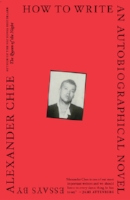Review: How to Write an Autobiographical Novel: Essays
/4 stars. I feel privileged to have read this. I was thrilled to read Queen of the Night and this is something equally special. Alexander Chee strikes me as one of the most honest writers out there, and the honesty of his essays in How to Write an Autobiographical Novel: Essays inspires.
I have always been a consumer. By that I mean the opposite of a creator. I've never enjoyed writing, only reading. Its why I have a degree in English literature, not English. And I studied art history, not art. I prefer to be reactive instead of proactive.
But the creative process absolutely fascinates me. I love reading about writing, and talking about writing, and learning how others approach the craft. And so I was deeply captivating by Chee's perspective on existing as a writer.
And, delightfully, so much more. I swam through this - floating easily at times, diving determinedly through others. I learned. Chee writes about AIDS, about advocacy, about being young, about hardship and tragedy and betrayal, about odd jobs and about 9/11 and the 2016 presidential election or, as it is simply called now, "the election."
He writes about trauma and art and the intersection of the two. I felt at times heartbroken for him, in awe of his self-awareness and resilience. I felt the relevance of his work and - interestingly, a strong sense of validation. There is a point to all this. A point to writing and reading and making art. “There's a reason that whenever fascists come to power, the writers are among the first to go to jail.” I was sad to finish. But also perhaps ... happy for him.
I think there are many out there who would find this book meaningful.
How to Write an Autobiographical Novel: Essays on: Amazon | Goodreads


